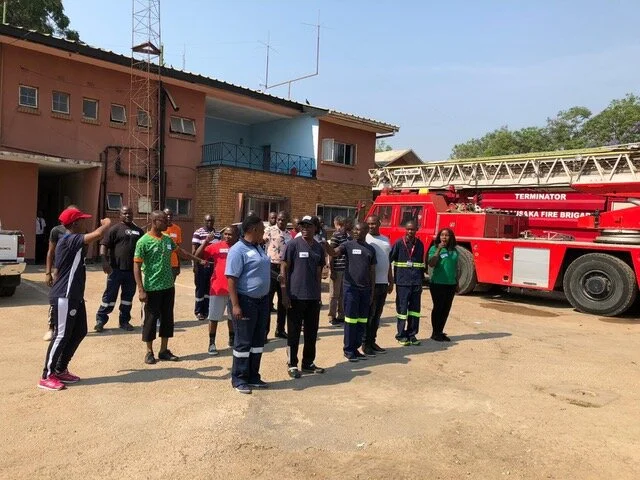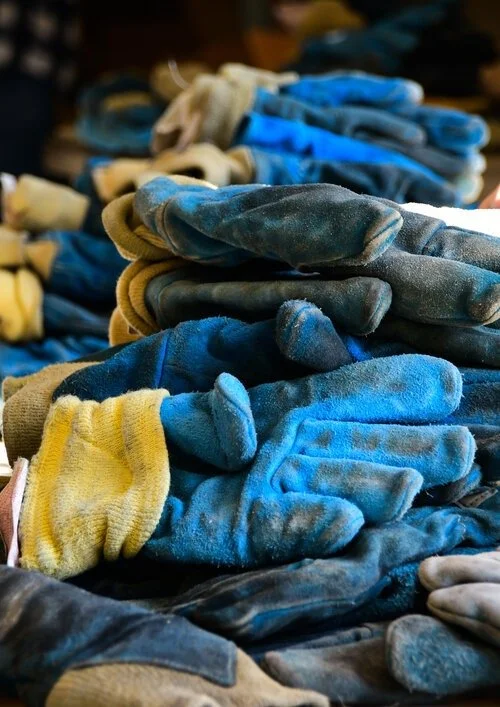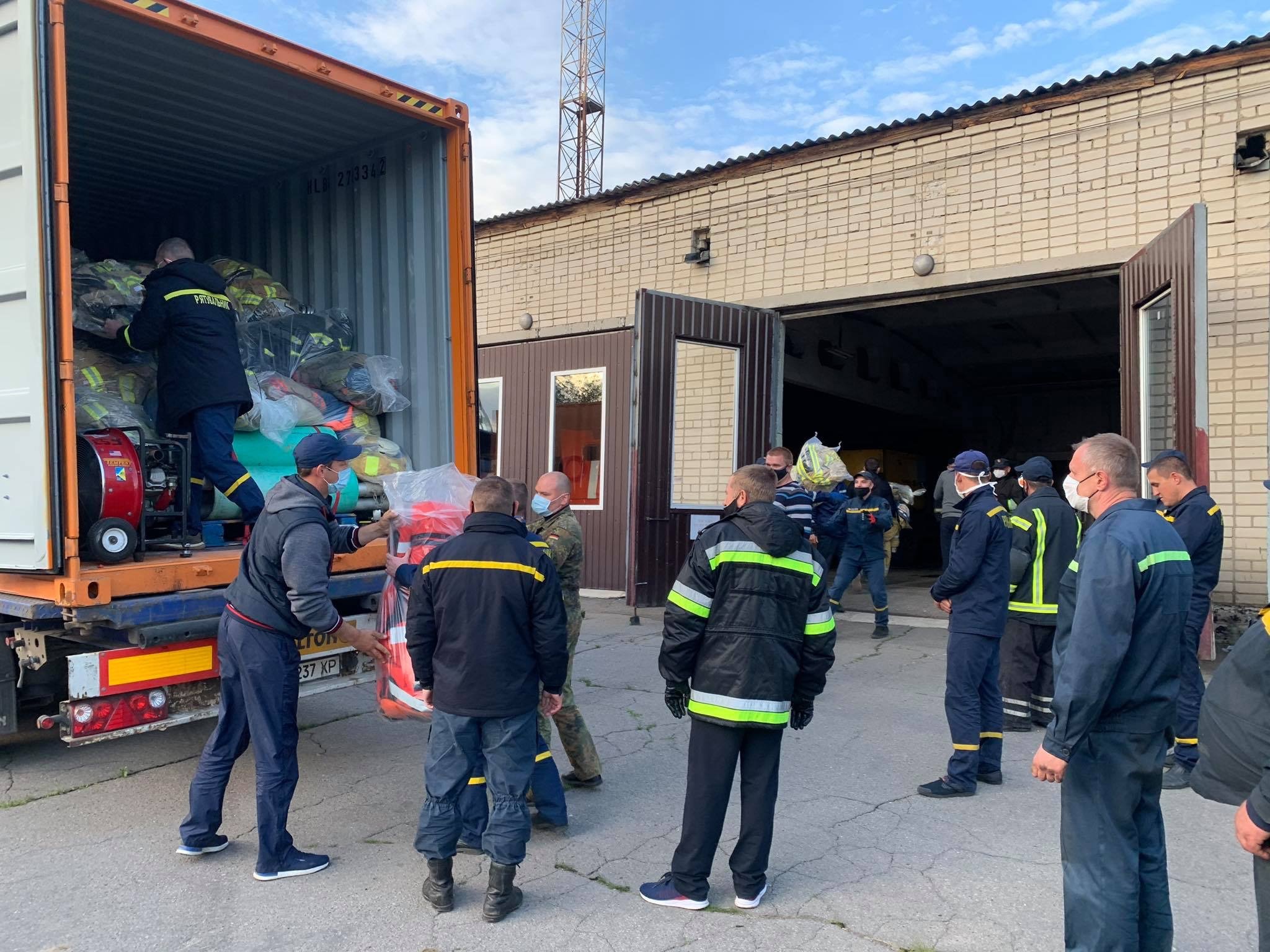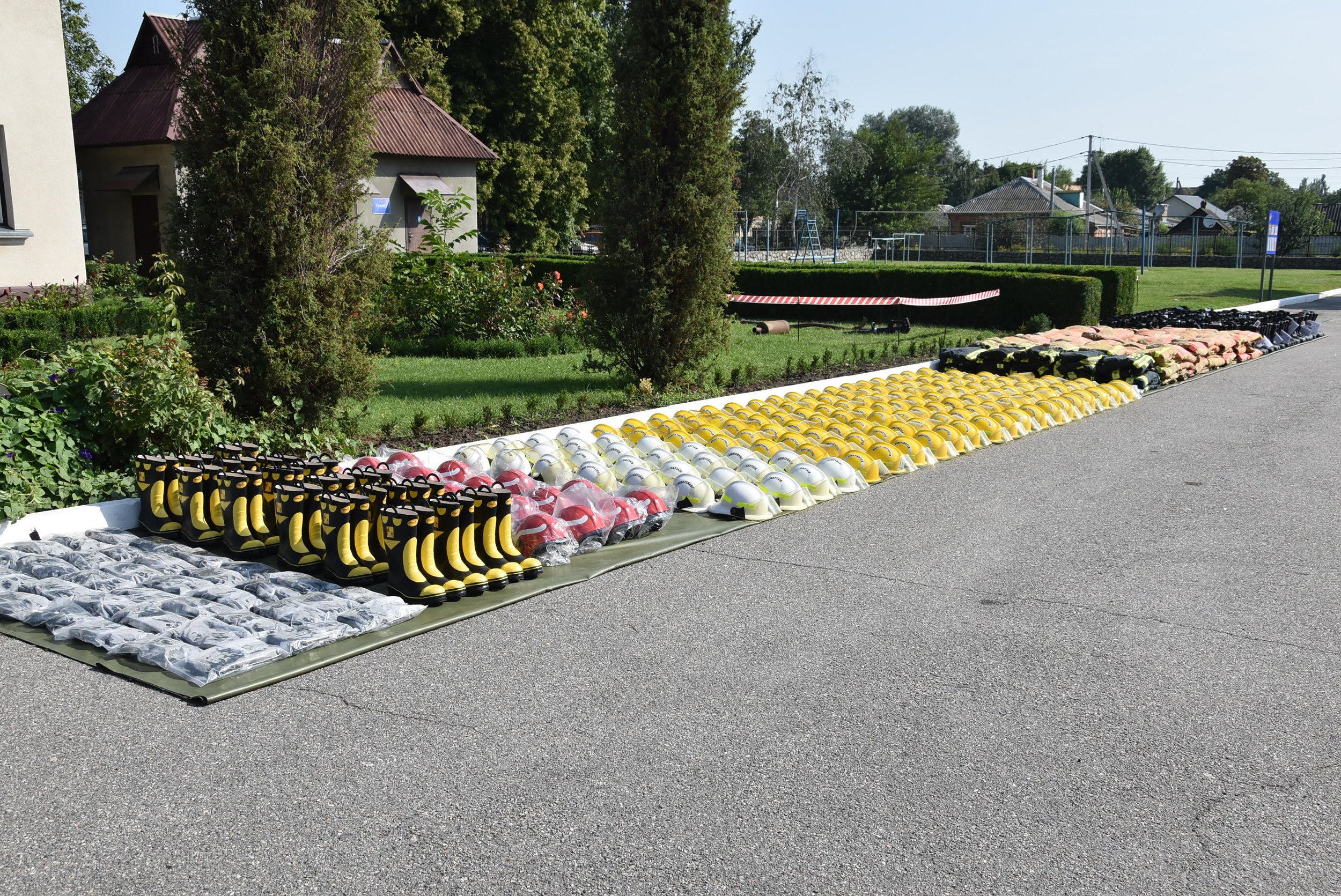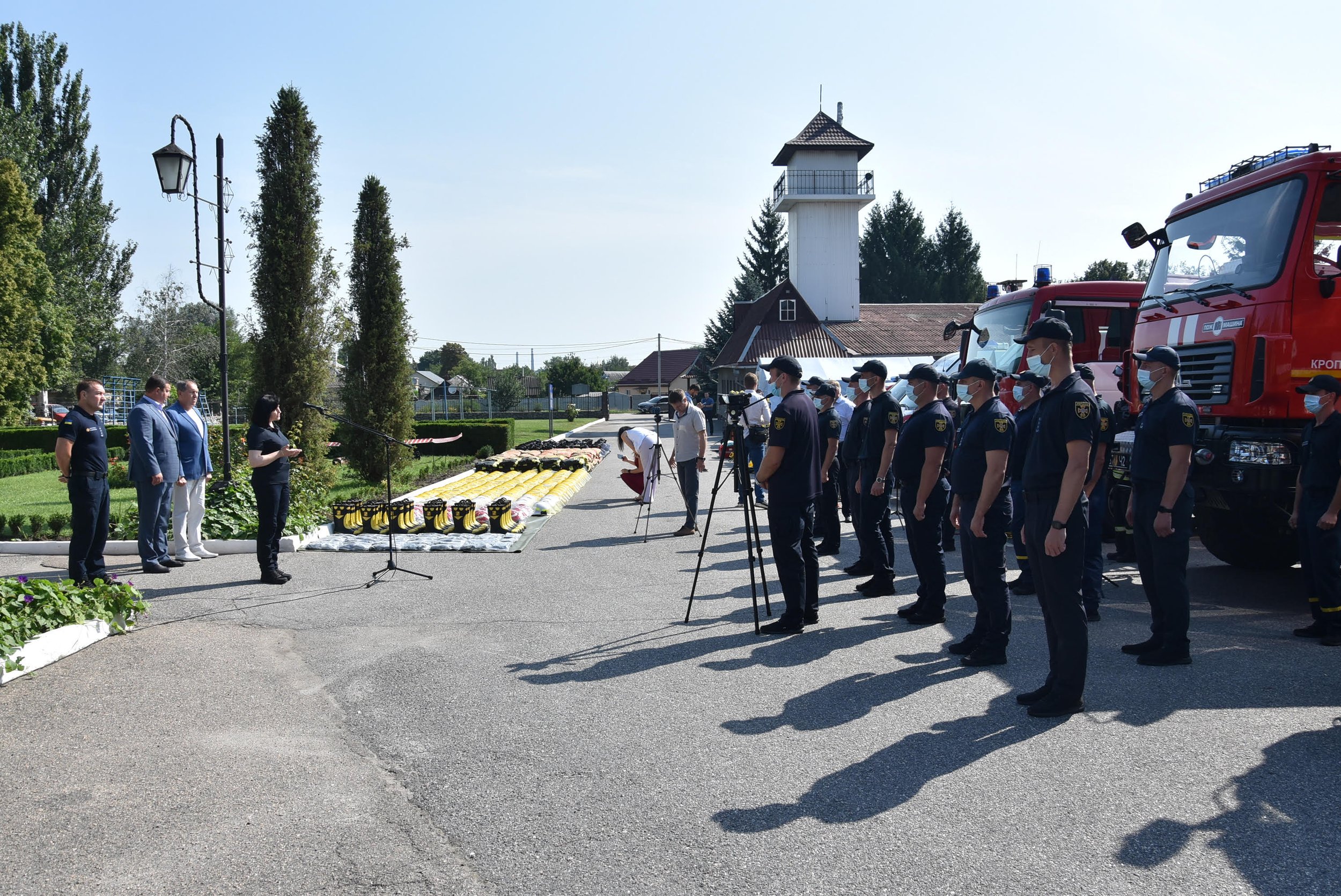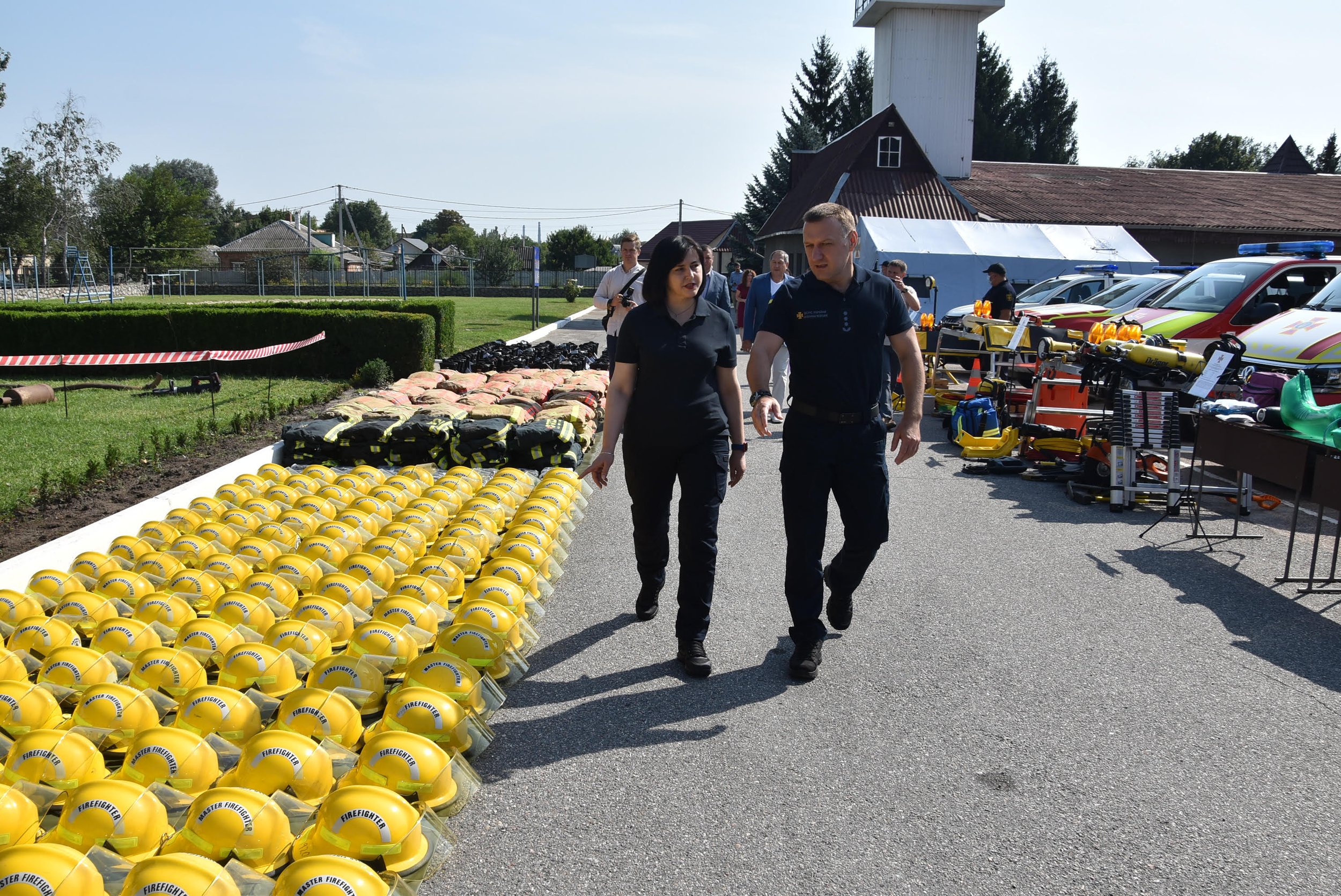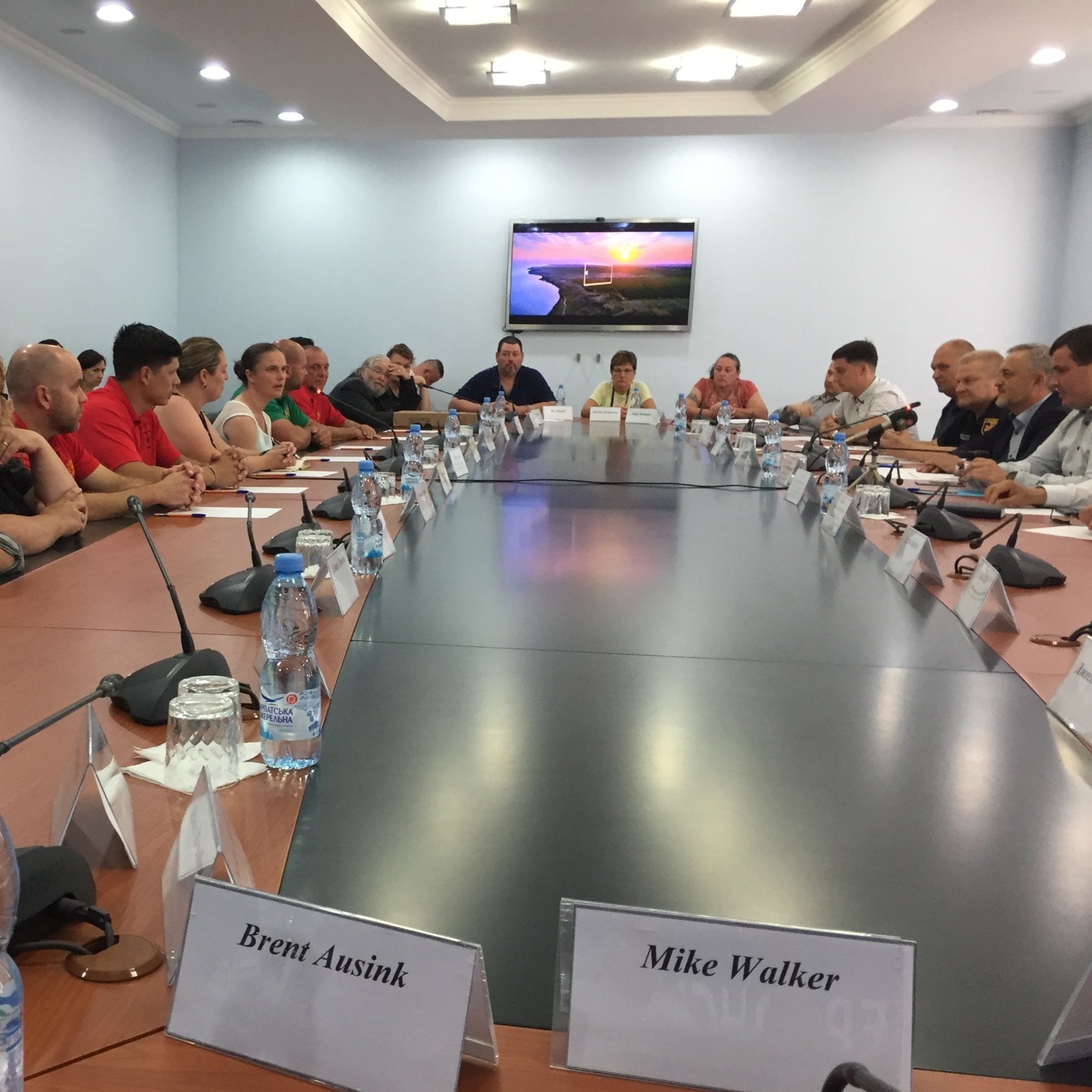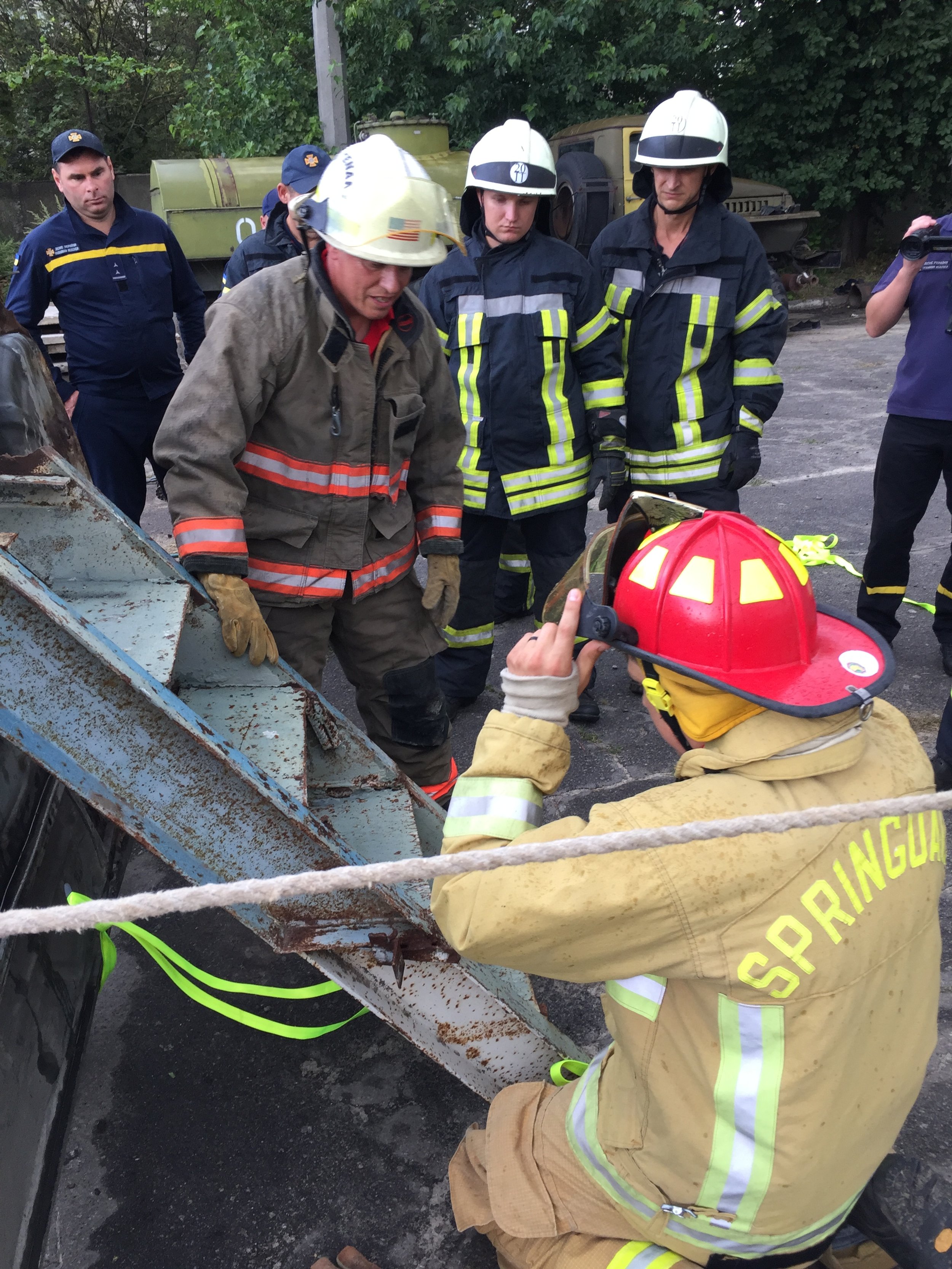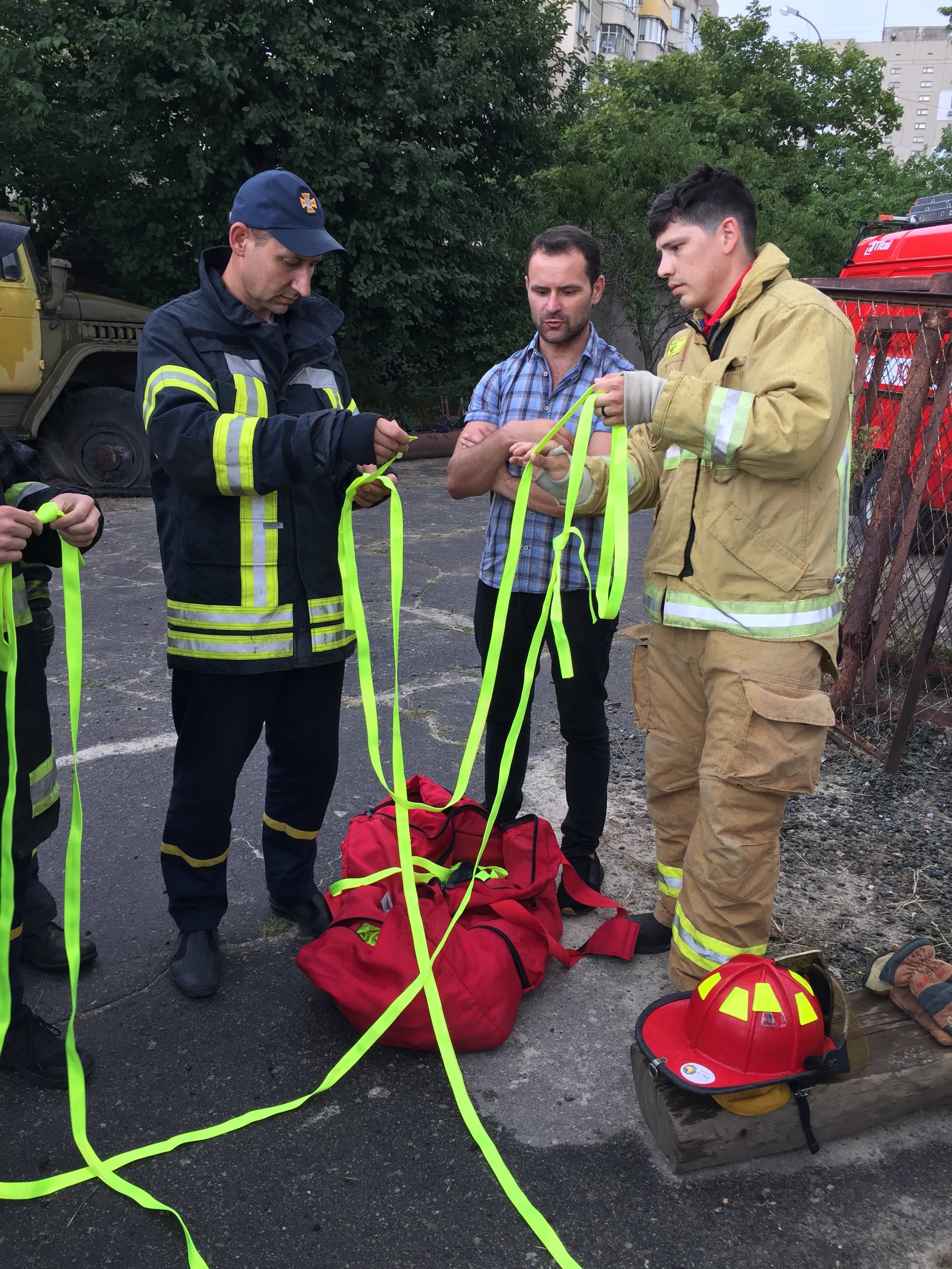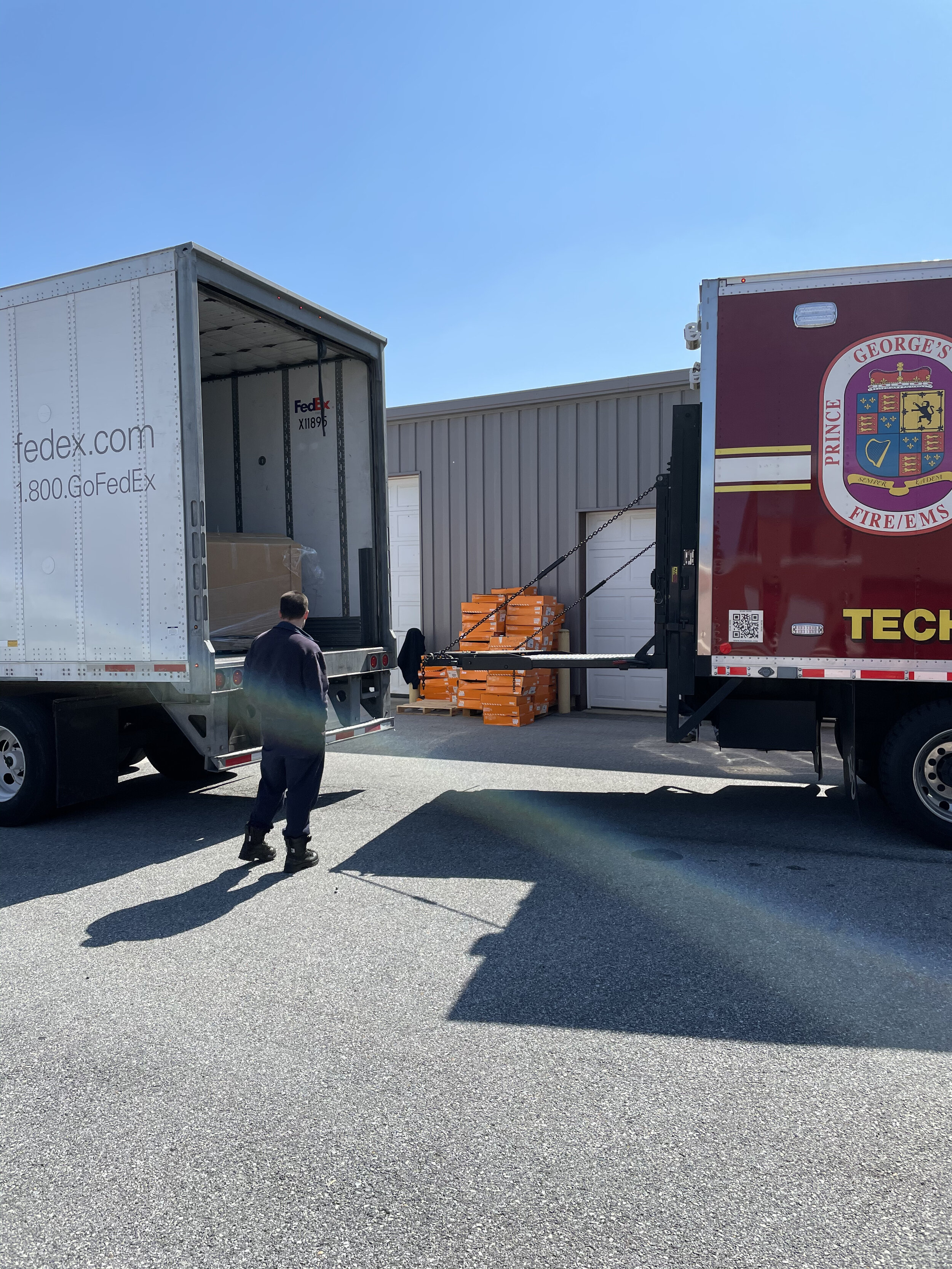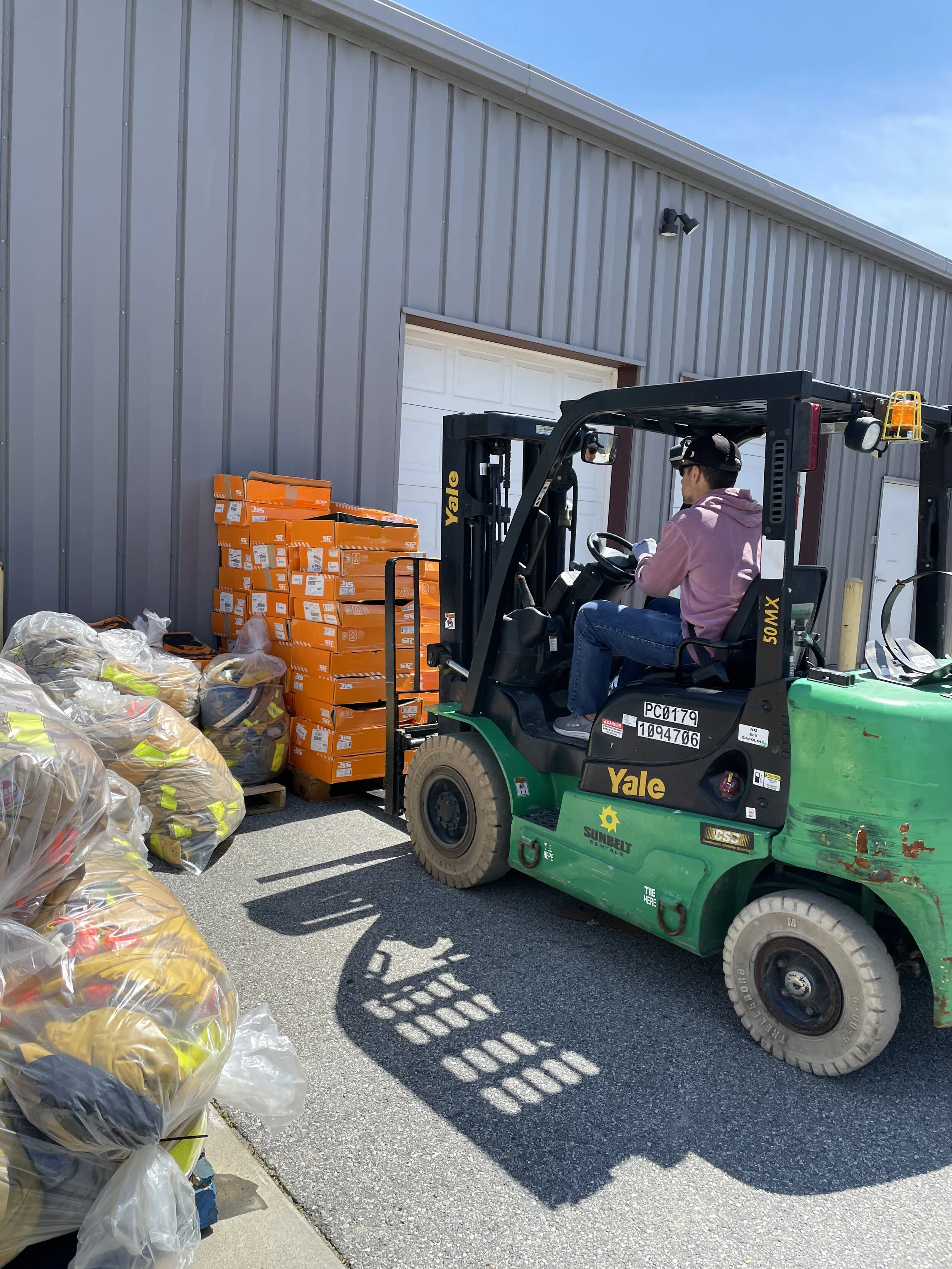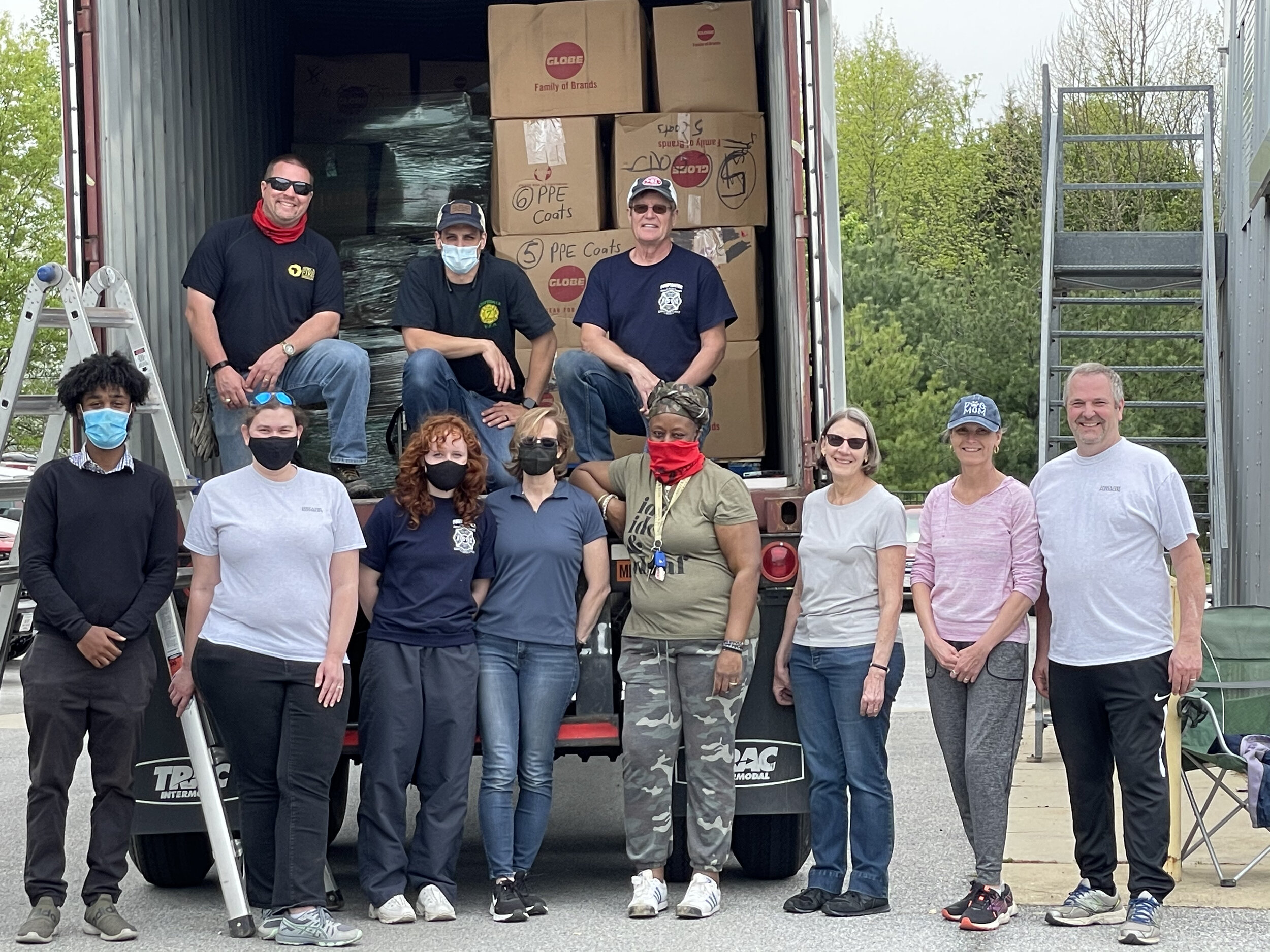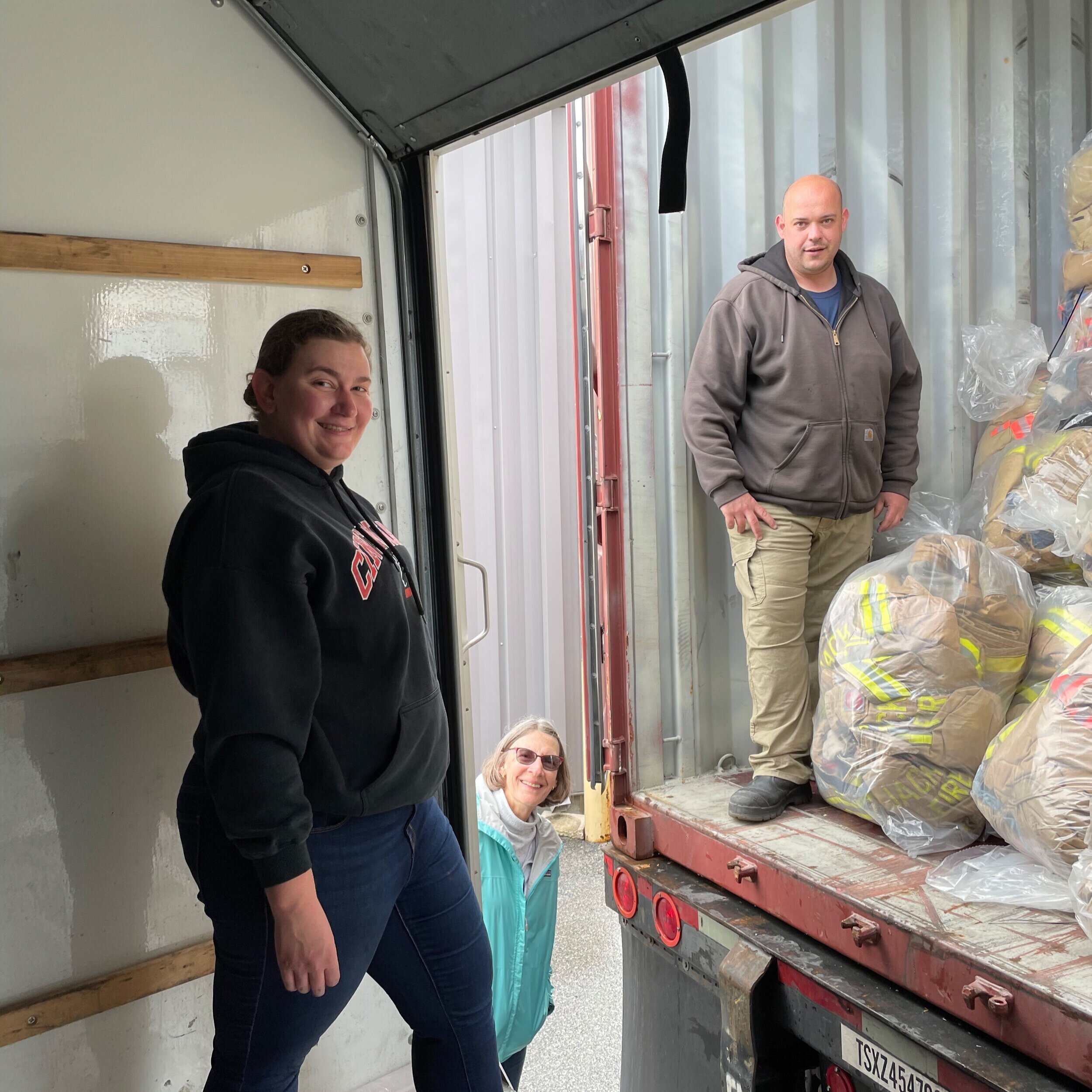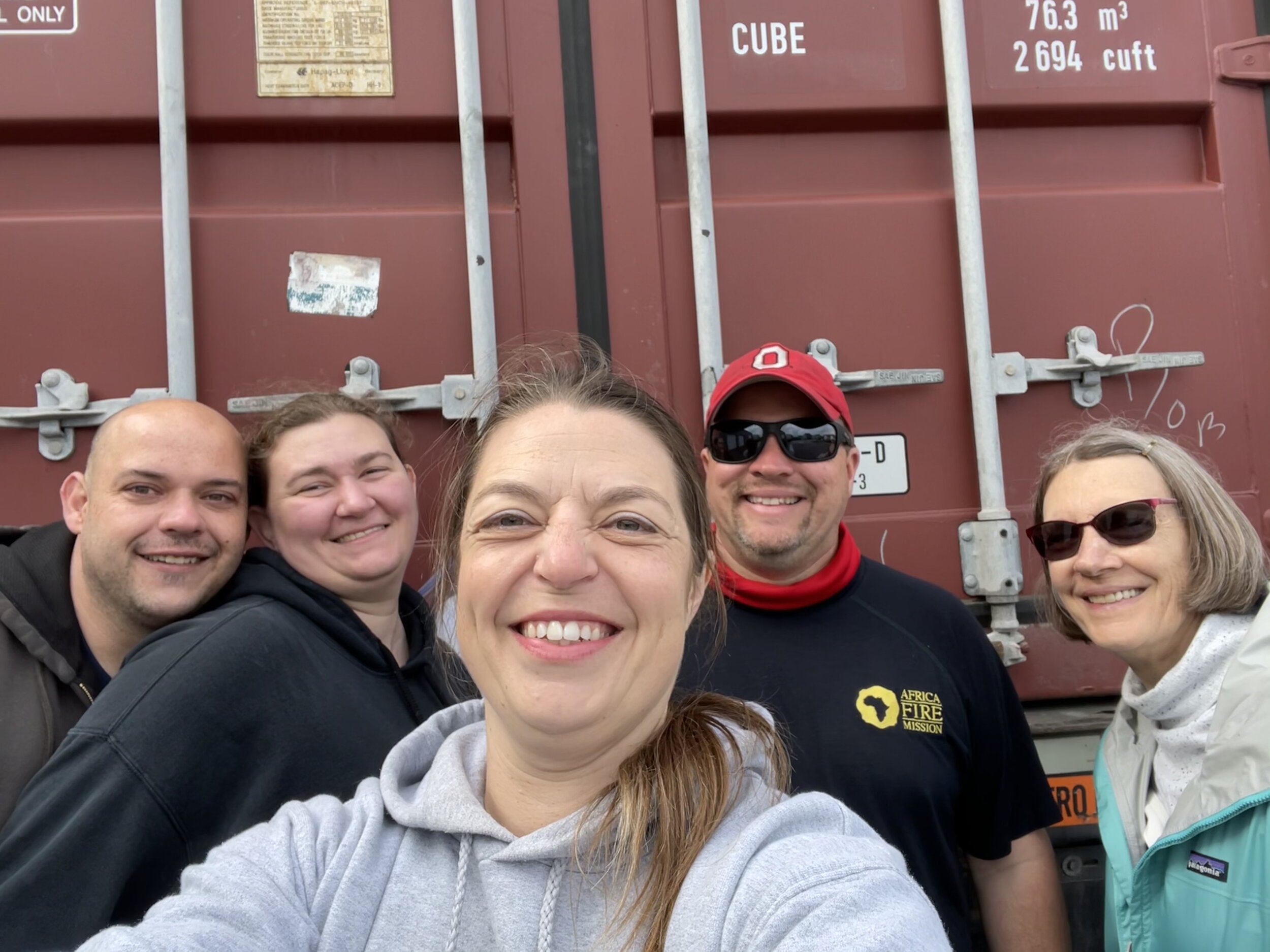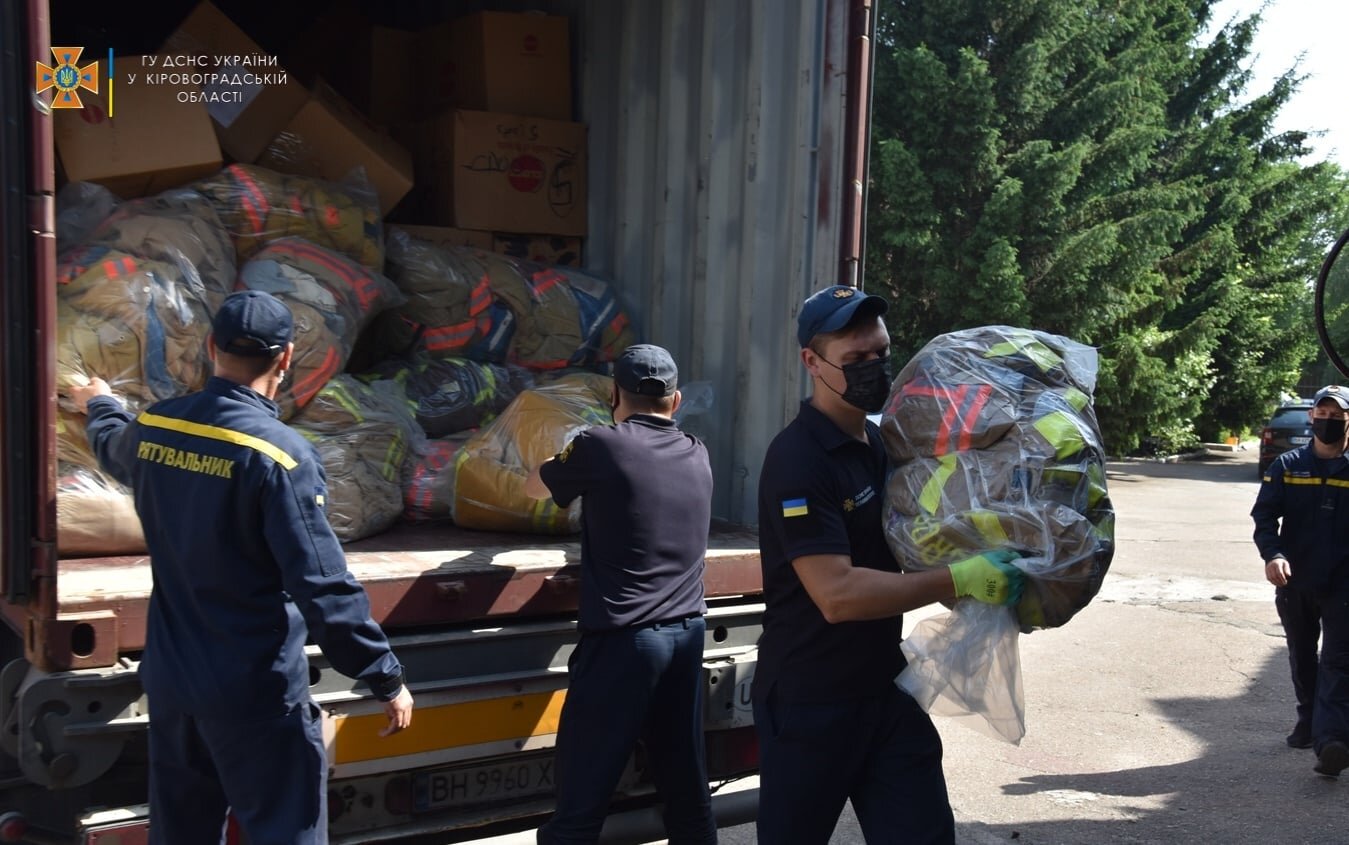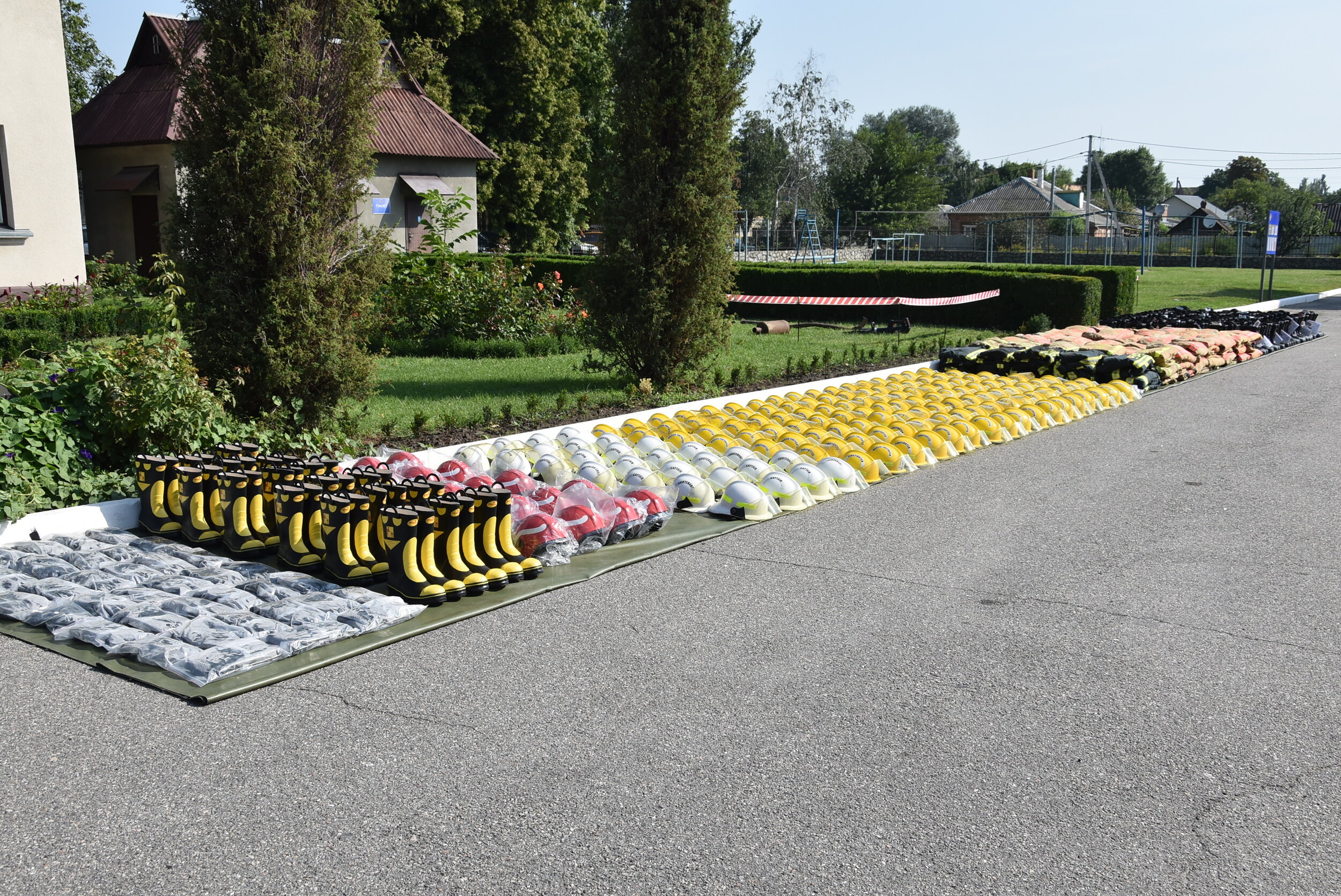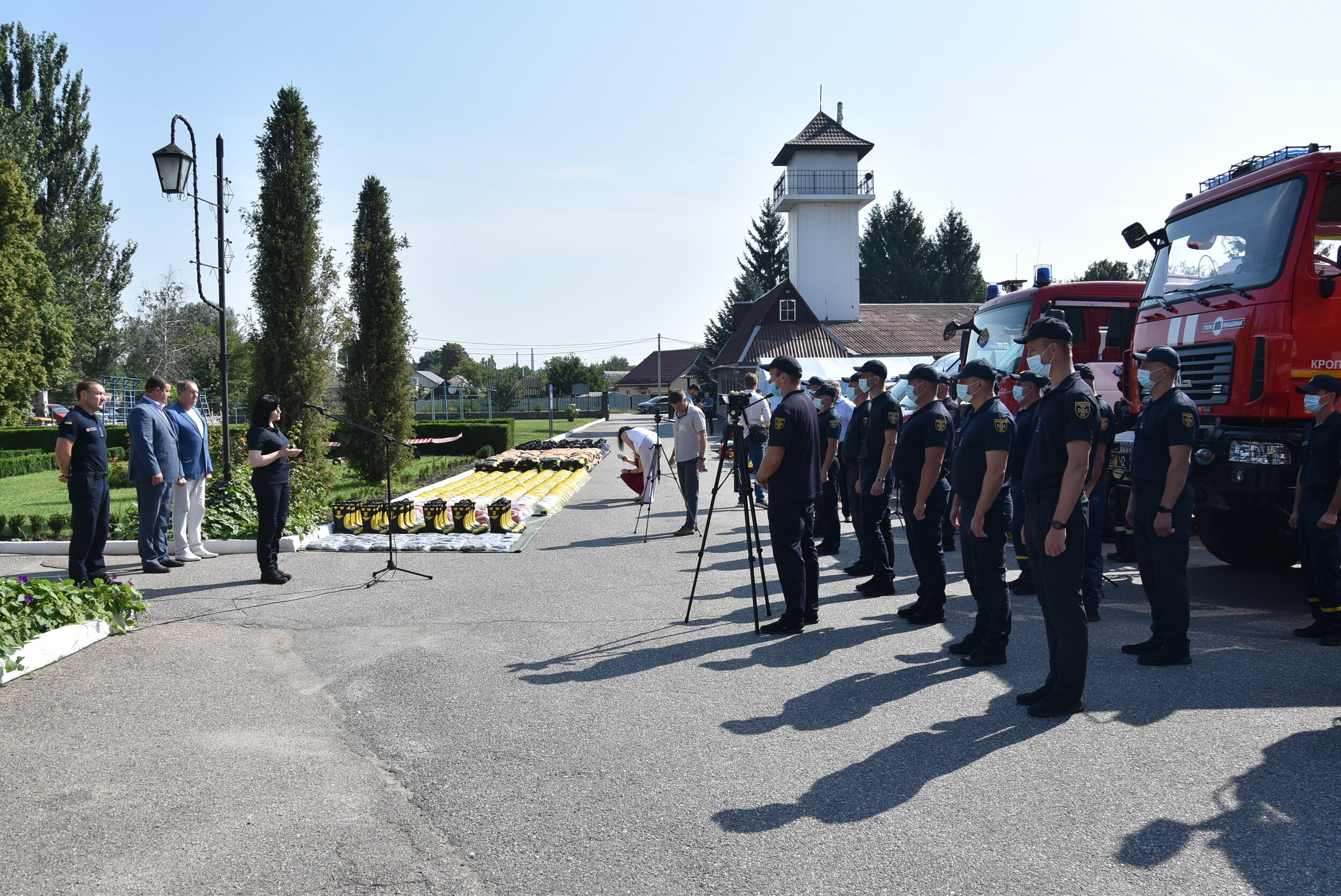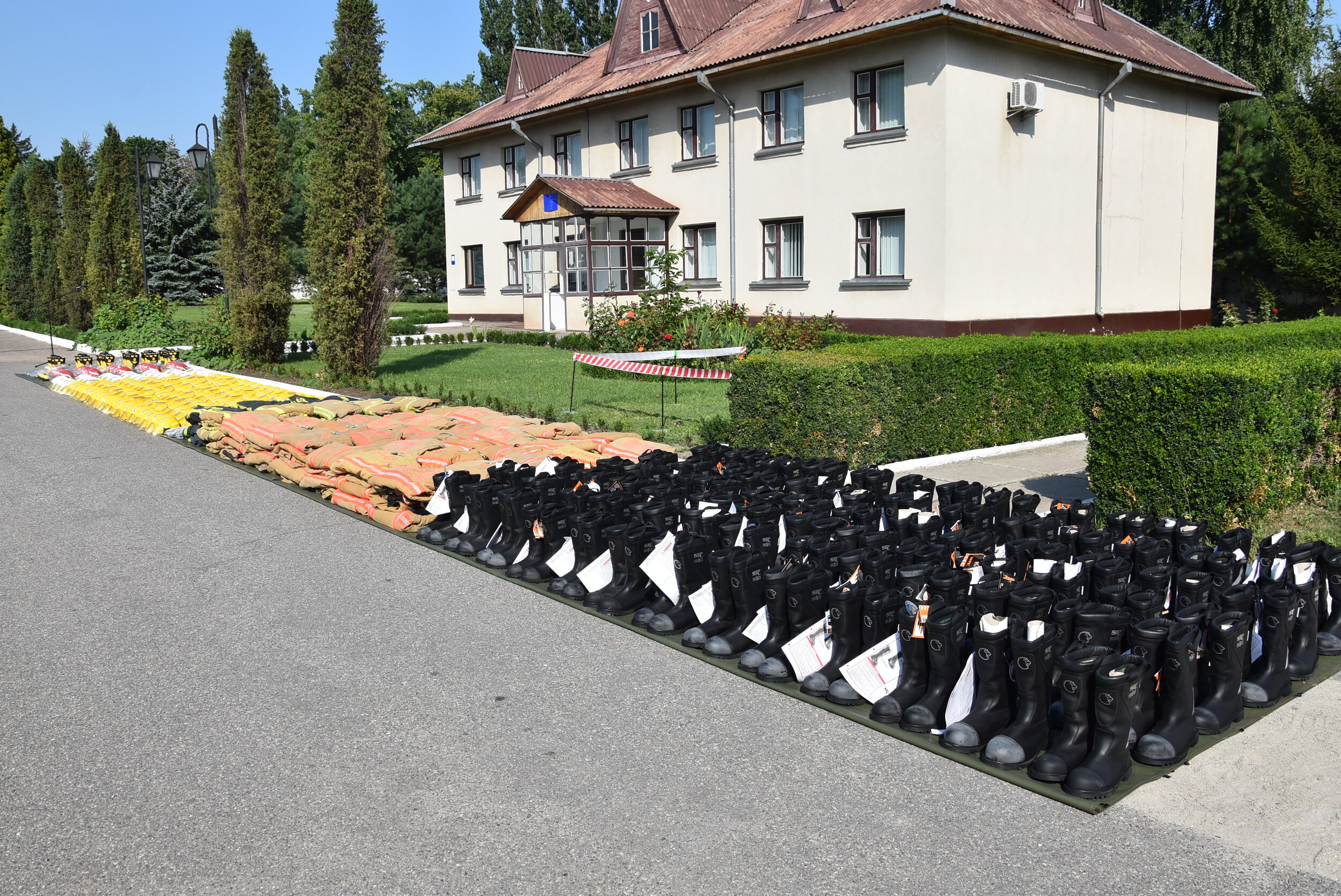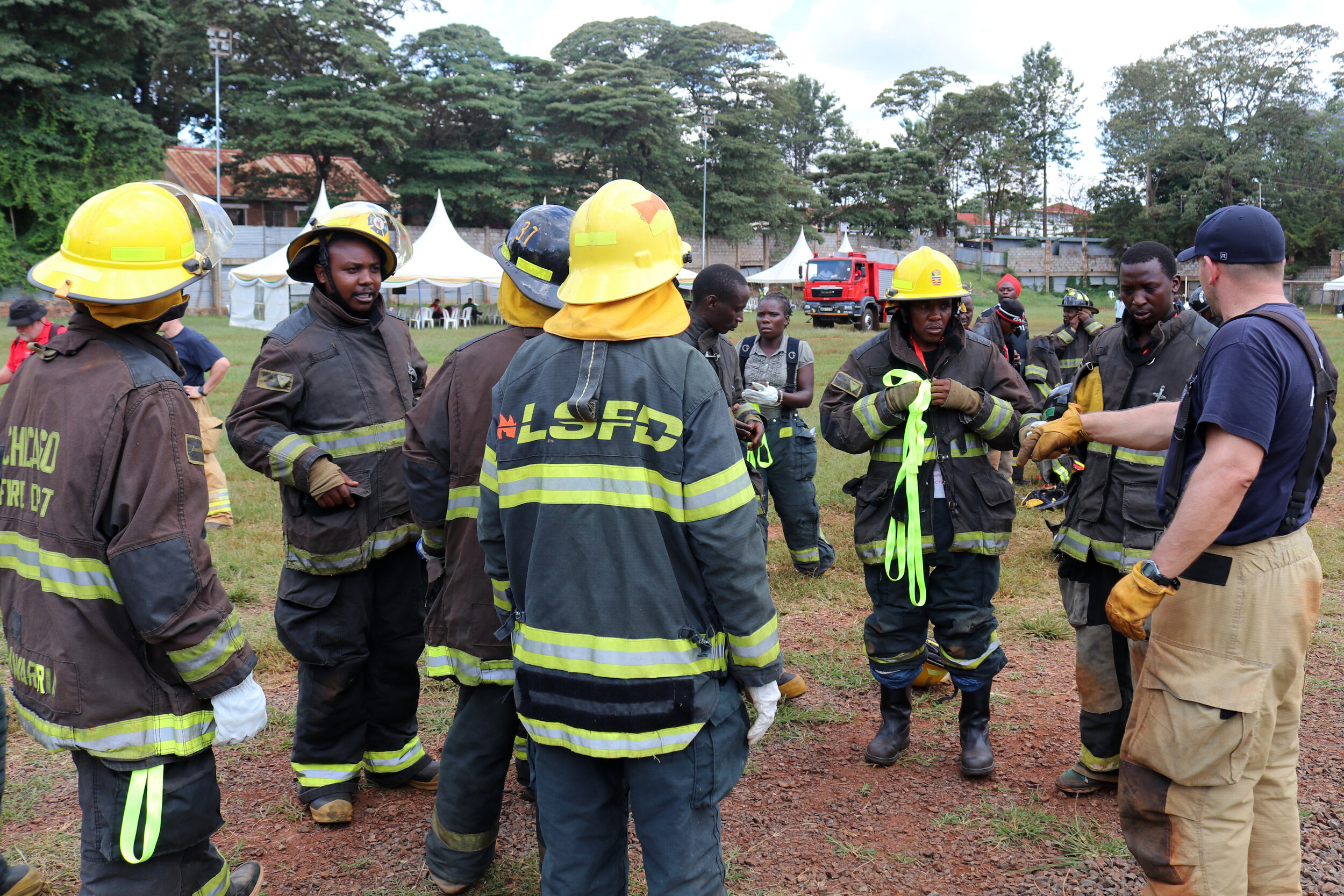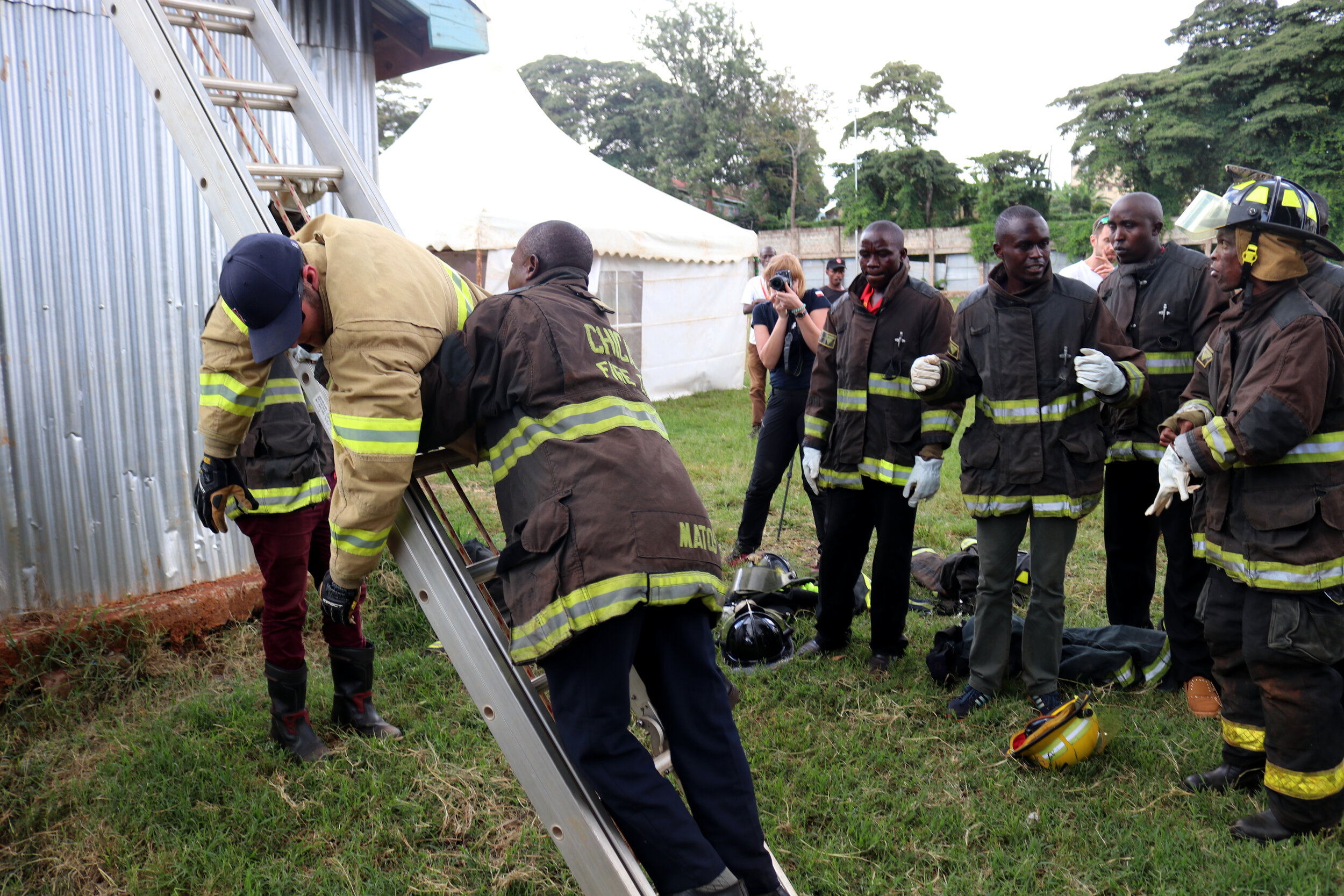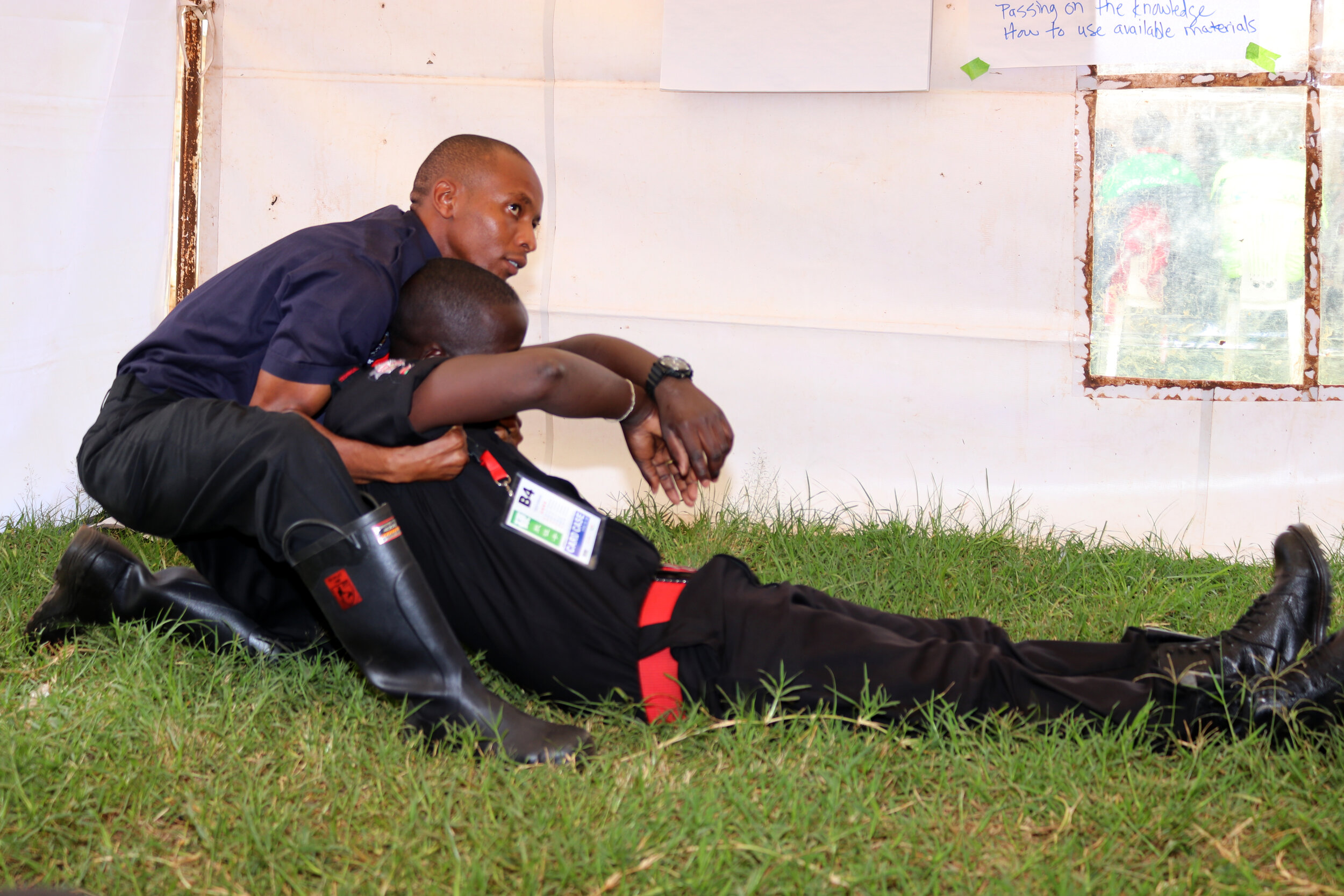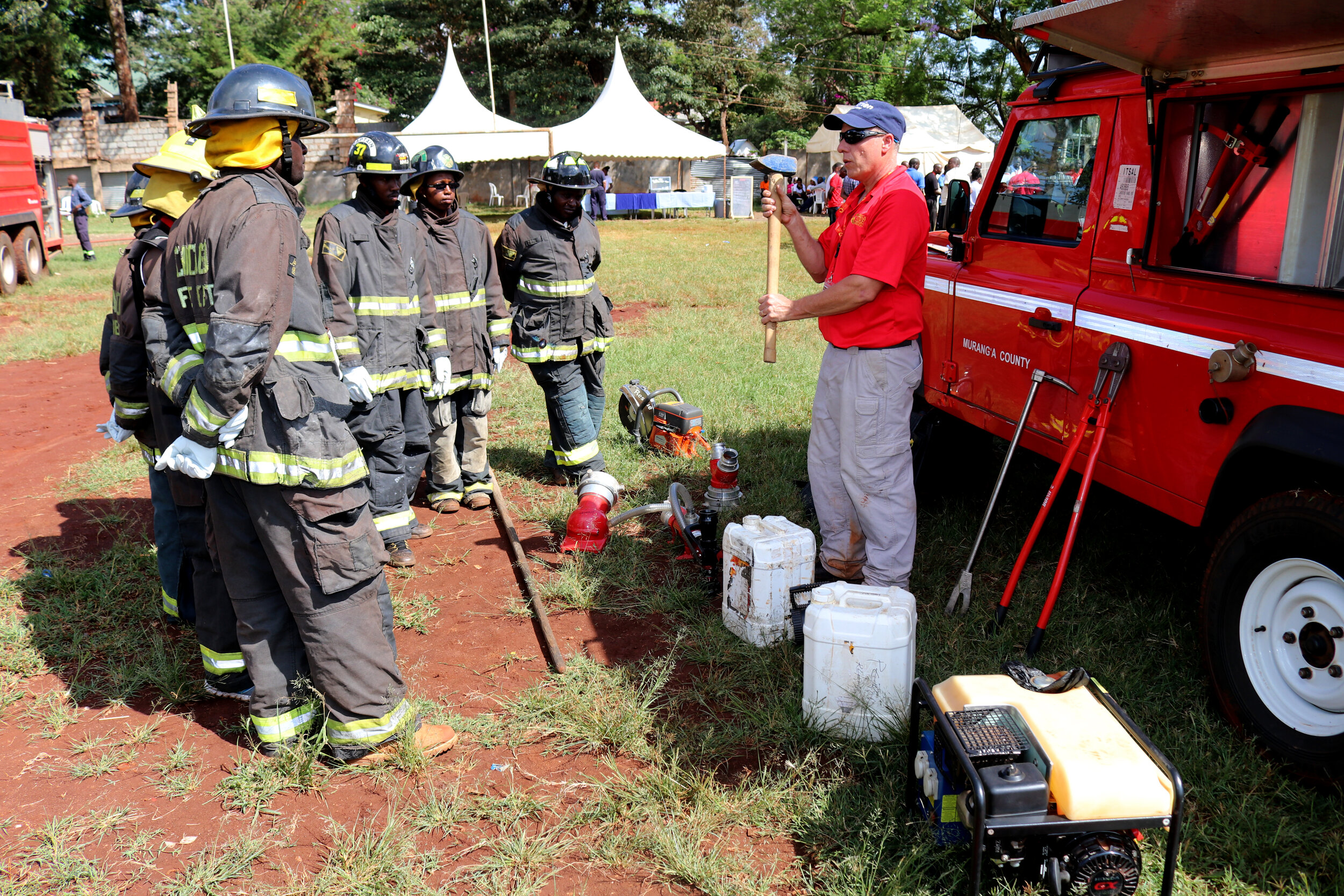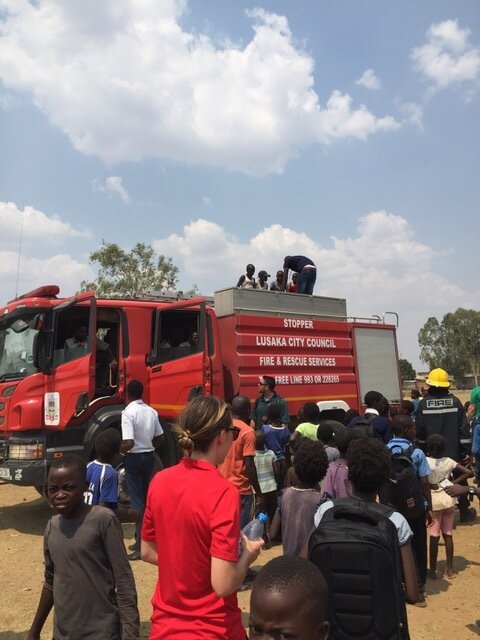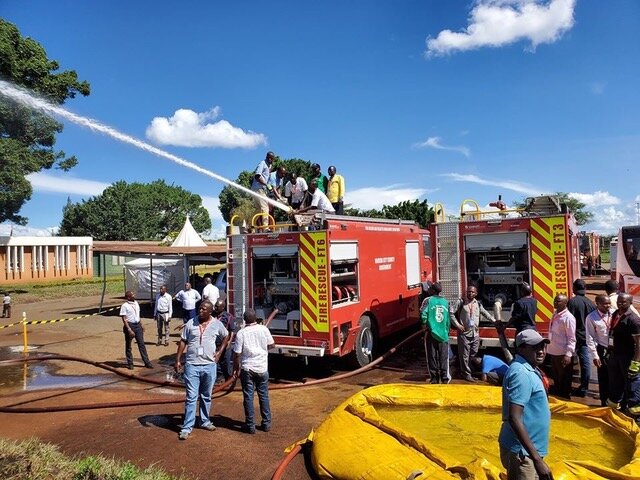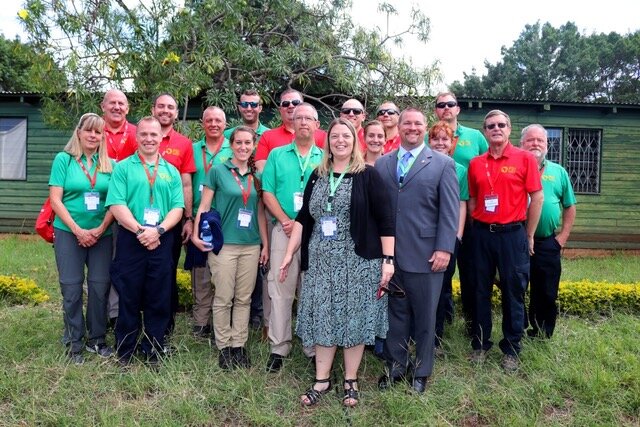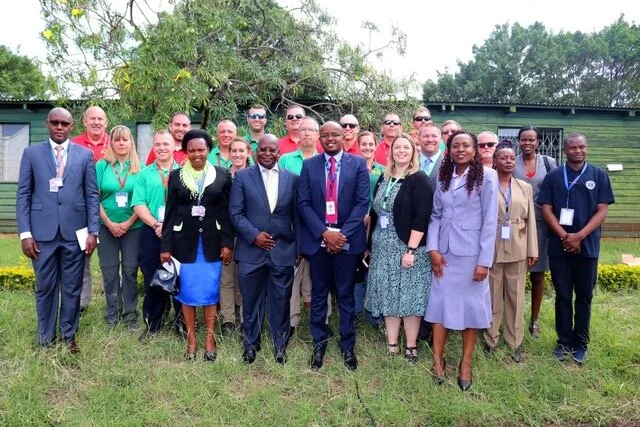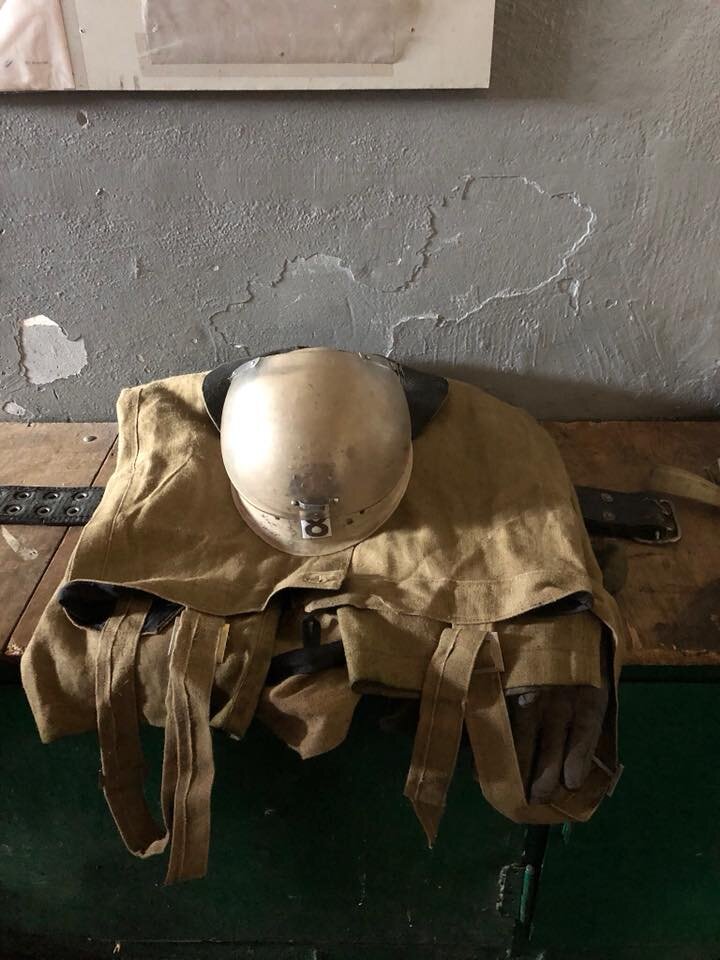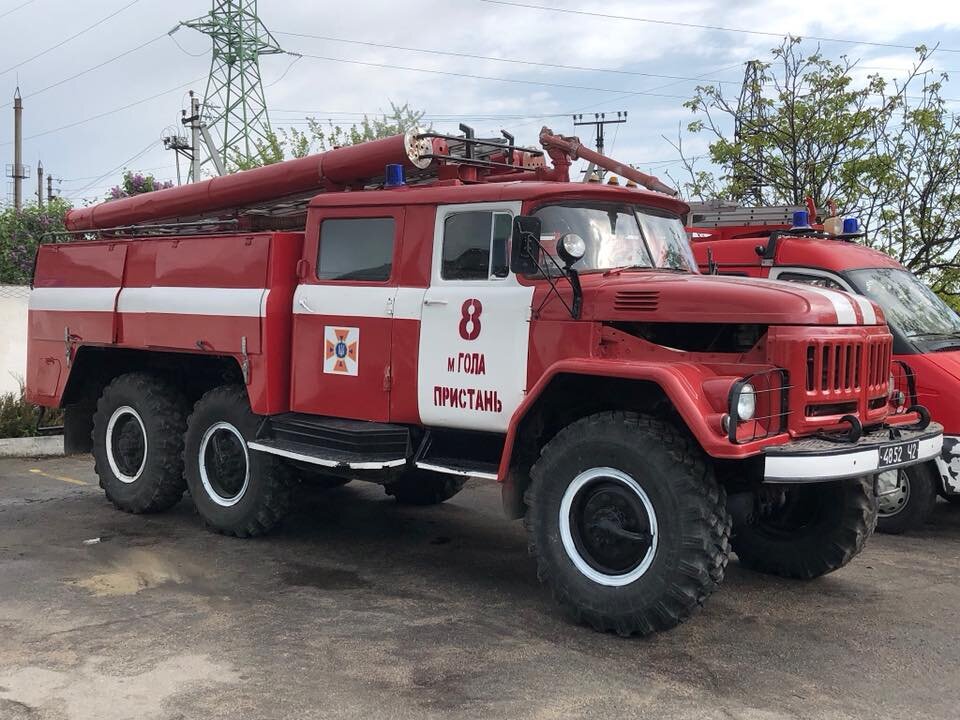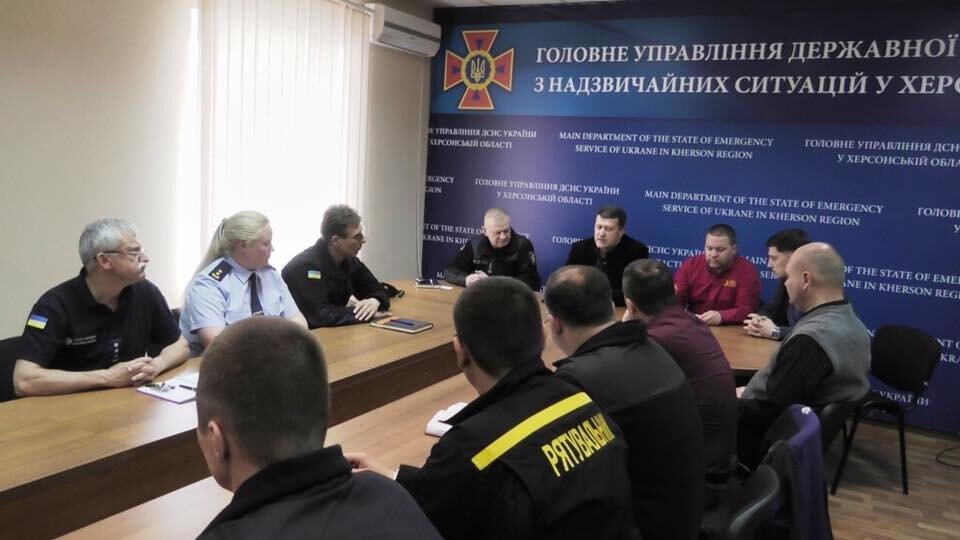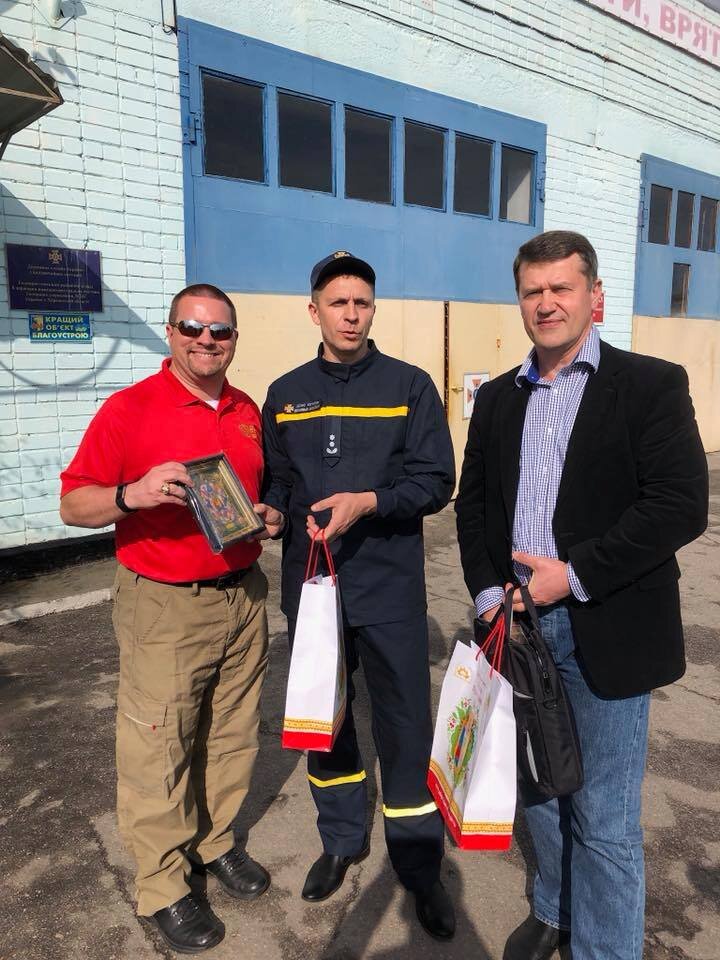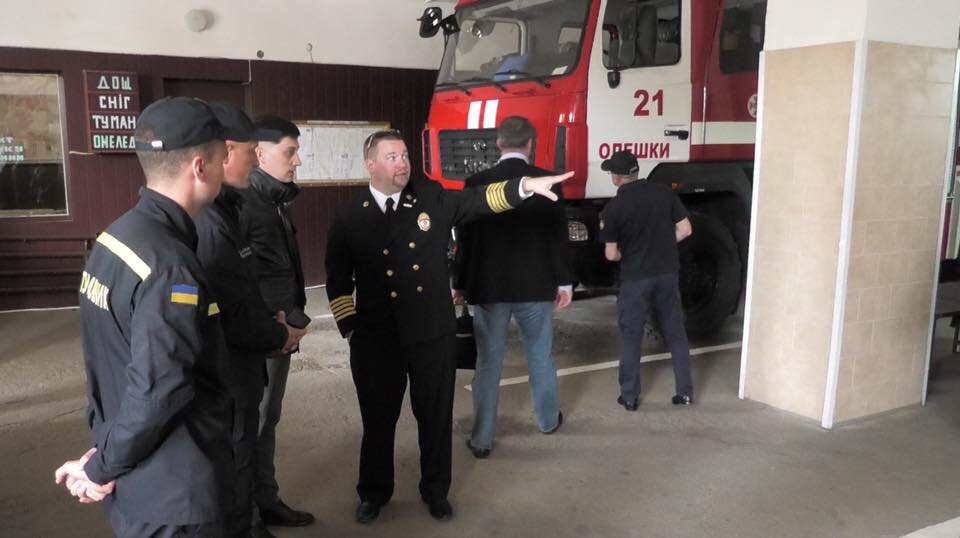AFM is specifically looking for firefighter PPE such as coats, pants, hoods, helmets, boots, and gloves. Please check our Equipment Needs to see a full list of gear we can or cannot accept.
AFM serving in Ukraine
By Nancy Moore
AFM has been serving in Ukraine with our partners Tavriski Christian Institute (TCI) and the State Emergency Services Ukraine since 2019. Our team that trained in 2019 remembers standing on the front defense lines from Crimea into Kherson and thinking how frightening war would be in that area. While we trained the firefighter we offered encouragement and connection to spiritual and mental health.
The firefighters in Ukraine are kind, giving, creative and brave. We were offered amazing hospitality while we trained alongside them. Firefighters in Ukraine are tasked with not only fighting fire, but also with disarming/recovering undetonated explosives and with providing psychological first aid to their community. Due to these somewhat unique functions, they were uniquely prepared to serve their community during the war in Ukraine.
Personally, Dave and I have been connected to Ukraine since the mid-90’s. Our church was providing support to churches and Christians in the post-Soviet era and helped to form TCI. TCI is now fully Ukrainian run and is the only accredited Christian College in Ukraine.
Located in Kherson, TCI’s staff evacuated their campus on the first day of war and staff were dispersed to various locations to continue serving. As a result of the war, TCI immediately began making plans to modify their ministry to serve the current needs of the country and to help churches serve their communities. TCI has 3 focuses right now: 1) Assist with safe evacuations from dangerous areas in Ukraine (both refugees and internally displaced persons) 2) Support churches financially that are serving their communities with resources especially for food and medical resources 3) Provide spiritual and emotional support. TCI is planning strategically for the current crisis, and is also preparing for the long term needs for humanitarian aid, Christian witness and eventual rebuilding of Ukraine.
TCI is on the front lines of humanitarian aid for Ukraine and many of AFM’s partners are collaborating to support their efforts. Please be praying for their efforts and for Ukraine: You can sign up for daily prayer updates throughout March through IDES > sign up here
If you are looking for an organization to give financially to support the people of Ukraine – I encourage you to give through TCI’s US forwarding agent sign up here.
Firefighters in Ukraine are serving their community during this war. Search and Rescue, removing explosives, assisting with community evacuations, fighting fires. I know their community is grateful for their service.
AFM is exploring ways to specifically support the firefighters in Ukraine – now and after the war (Equipment was a need before the war and there is still a need for more equipment). We are also looking into ways that we can support the firefighter’s psychologically and spiritually. If you are interested in getting involved with AFM’s efforts to serve firefighters in Ukraine please email info@africafiremission.org and we will get in touch with you!
Here are some pictures from Ukraine as AFM worked there before the war:
Firefighter Mental Health
By Howard Cohen
Fire fighting is one of the best jobs around. It is also one of the most dangerous. As firefighters we train and prepare to run into burning buildings, mitigate hazardous materials, work car accidents on busy roads, and deal with angry, hostile citizens. But we tend to not train or prepare for one of the greatest risks to our physical, emotional, and spiritual health: Frequent exposure to traumatic events. Studies in North America show how over time the stressors associated with exposure to traumatic events pose a serious challenge to our emotional, mental, and spiritual health. For example, a study of firefighters in the United States revealed that 46% experienced suicide ideation; 19% participated in suicide planning; and 15% attempted suicide. In addition, studies conducted in other countries[1], including Kenya[2], also show that post-traumatic stress symptoms and illness rates among emergency services workers are significantly higher than in the general population. Firefighters every where face the same physical dangers and traumatic events. Therefore, as studies show, firefighters worldwide also suffer higher post-traumatic stress symptoms and illness rates than the general population. Fortunately, we have the tools to help us, and our brothers and sisters in the fire service, address the stressors that arise from encountering traumatic events.
What is a traumatic event? A good working definition is that it is an incident that evokes a strong emotional reaction with the potential of interfering in our lives. Unfortunately, as first responders we often hide our emotional responses to bad calls behind a mask of toughness. This means that sometimes the impact of a tough call unfolds over time. This can make it harder for us to recognize a connection between what we experience on a call and its emotional, physical and spiritual effects on us. It is also important to realize that not everyone’s emotional response to a call will be the same.
Stressful events produce a complex interplay of nervous, endocrine, and immune mechanisms responses. In other words, our normal way of being is disrupted. The fight or flight or freeze response is an example of this. How quickly we regain our homeostasis and return to normal or typical functioning depends on how resilient we are. Resiliency is our key to coping with stressful events. The good news is that resiliency is a skill we can develop. It doesn’t require any special equipment or hours of exercises. In fact, it is the natural outcome of some very enjoyable and healthy activities. Here are some ways to build your resilience for when you’ll need it.
• Eat healthy food
• Develop hobbies and interests outside of work
• Cultivate friendships with those whom you can speak openly and honestly
• Nurture your spiritual life
• Practice mindfulness such as yoga or meditation
• Exercise
• Relax, go on vacations
• Be kind to yourself
• Embrace change
• Remind yourself that you have the most meaningful job in the world
• Embrace healthy thoughts
• Be open to getting help if you think you might need it.
There are many signs that we, or someone we know, may be adversely affected by a traumatic event or an accumulation of unprocessed events. These signs may include some or all of the following:
•Fatigue • Grief
• Chest pains • Denial
• Loss of emotional control • Depression
• Difficulty paying attention • Anger
• Difficult making decisions • Change in appetite
• Nightmares • Misuse of alcohol or drugs
• Intrusive images • Anger at God/Crisis of faith
• Anxiety • Withdrawing from others
• Guilt
When someone you care about is exhibiting some of the above signs gently bring your observations to their attention. Be sure to let them know that you are coming from a place of love and concern. Though it isn’t always easy to approach a friend and colleague who is hurting, the price to pay for not to doing so could be very high. As you know, a firefighter not performing at peak levels because of stressors is a potential risk to herself or other firefighters. Hopefully, if we are ever exhibiting signs of not coping with the stressors in our life well or with a particularly bad call one of our friends and colleagues will let us know. Awareness of these outward signs, whether as the result of self reflection or because it was brought to our attention, is critical.
Developing situational awareness on the fire ground is a critical skill taught to every firefighter. Emotional and mental health situational awareness is a critical skill for building resilience; this skill should be taught to every firefighter because traumatic events and bad calls go hand in hand with the job Whether it is a fatal car crash, burn victim, suicide or the death of a child, these encounters take a toll. It is no surprise that many firefighters are haunted by the tragedies they witness as a part of their job every day. Fortunately, with increased awareness and resilience building skills firefighters today are better able to cope with the stresses that go with having the best job in the world.
[1] First Responders and PTSD: A Literature Review By Ashley Fitzpatrick, BSN, RN, EMT -
7.28.2020
[2] Rationale for Early Psychological Intervention Among Disaster Actors in Nairobi County, Kenya by Eunice K. Ndulu & Dr. Maragret Iyaya, Journal of Education and Practice; Vol. 10, No 32, 2019.
Fire Equipment Arrives in Kirovohrad, Ukraine
On April 24, 2021 a group of volunteers gathered to load a 40’ shipping container full of over 3,500 pieces of firefighting equipment valued at over $1.5 million if new.
The equipment made it’s way across the ocean to Odessa, Ukraine and on August 11, 2021, ceremonial events were held on the occasion of handing over humanitarian aid from Africa Fire Mission to Main Department of the Civil Service of Ukraine in the Kirovohrad Region.
Deputy Chief Vadym Yanishevsky says: “We are extremely grateful to you for this significant contribution to the development of material and technical support of firefighters and rescuers of the region and increase the efficiency of their tasks. We hope for further close and fruitful cooperation for the benefit of public interests with you. We wish you and your organization success and prosperity!”
Thank you for partnering with AFM to help make shipment happen! The Personal Protective Equipment will help the firefighters in Ukraine be able to safely and effectively do their jobs! We are looking forward to bringing training to firefighters in Kherson and Kirovohrad region in 2022!
Conducting Regular Training at your Fire Station
by Jon Seastone
Jon is a structural and wildland firefighter with the Denver Fire Department, Colorado. Jon has been training with AFM since 2017 in Kenya.
Company training is of vital importance to fire crews. Small problems often happen during fire calls and company training can help to minimize those problems and prevent small problems from becoming big problems. Laziness and complacency is a recipe for disaster when an overwhelming emergency call rears its ugly head. Company training also develops camaraderie betweens firefighters and builds teamwork. Because firefighters took the time to train prior to arriving at a fire scene, fire companies will have a sense of what their fellow crew members will do, sometimes without the need to verbally communicate the actions. Firefighters who regularly train together feel like they can “read each other’s minds” during incidents because drilling causes a team to move as one force. For these reasons, daily company drills and training is of vital importance.
Company training does not have to be a grueling or extensive process. It can be as simple as taking one item off the truck and becoming familiar with it or driving around your response district and familiarizing the company with buildings and target hazards. Being deliberate and disciplined in doing daily training becomes a habit and continuously develops knowledge within a firehouse.
When firefighters are sleep deprived, fatigued, hungry or distracted by other parts of our life, we must depend on our training as a foundation to help push through when our mind may not be operating at maximum levels. By running through scenarios and putting hands on equipment, we develop muscle memory that will take over in times of stress. We can then build on these scenarios and find additional “outside the box” scenarios or possible plans “B” and “C” if plan A fails.
During company drilling equipment is taken out and checked, and used for training, then cleaned and put back in service. Often, problems with the equipment may be discovered and can be resolved prior to an incident. It is best to immediately remove damaged or non working equipment from service till the issue has been resolved or the equipment has been repaired. It’s a very empty feeling to be in the middle of an emergency call and have an equipment fail that might have been discovered had the equipment been used for training.
Company training and drilling require intentionality. Every firefighter can step up and come up with training to pass onto others. Senior firefighters need to be deliberate about training with younger, less experienced firefighters. These more senior members can pass on stories and experiences that are invaluable in giving younger firefighters the knowledge of past calls and experiences that they can use as preparation for future emergencies that they might encounter. Senior firefighters are the leaders within the firehouse that can encourage others to take the reigns and pass along knowledge thereby making the fire service better in the future. The best thing a senior firefighter can do when faced with a question or scenario is be humble enough to say,”I don’t have an answer, but let’s try to figure it out together.” They can lead by example by being the hardest workers in the firehouse.
The fire service is built on “never stop learning” mentality. It does not necessarily mean that departments must reinvent the wheel; but instead build on previous foundations and find new ways to accomplish tasks. The responsibility does not always fall on the chief or upper management. Although the Chief does have some culpability when it comes to training, training and drilling has been and will continue to start at the lowest level of the fire service, in other words with the firefighters.
Here are some examples of drills/training that firefighters can do in their own area:
Practice rescuing each other using drags and carries. What will you do if you have to rescue each other out of a building or a window? What if you have rescued a civilian in the same ways?
Have a discussion about the types of buildings within your response areas. What are some target hazards or places that could be exceptionally dangerous for firefighters and how will you respond to those hazards? Discuss and plan possible responses within your company.
If you carry ropes on your truck, pull those off and tie knots with each other. Teach each other useful knots that you know but maybe the firefighter next to you might not. When you are done, check the rope for damage.
Practice throwing ladders to various buildings and techniques for taking victims down the ladder.
Practice searching for people or following a hose pipe in the firehouse while blindfolded to use your other senses in case you can’t see during a fire.
Watch videos of firefighter training from all over the world and then try it yourself to see if it works for you.
These are only a few examples. What are your ideas? Add your ideas to the AFM networking group because we can all learn from each other!
Fire equipment delivered to Ukraine
On May 8, 2020 a container of 700 sets personal protective equipment and jaws of life (used for vehicle extrication) was delivered to the State Emergency Services of Ukraine, Kherson Region. We are grateful to our partners at Tavriski Christian Institute and at IDES that have helped to make this possible.
While our team training trip to Ukraine for 2020 has been postponed until 2021 due to COVID-19 we are grateful that our connections to the fire service in Kherson can continue.
Wrapping up 2019 and bringing in 2020
2019 was a busy year for AFM and 2020 is shaping up to be even busier! We are seeing more and more ways that God is using AFM to advance life & prosperity in developing communities through the fire service in Africa (and Ukraine!). The end of 2019 had us leading 4 teams to Africa with 35 trip team members! Fire training is having an impact on saving lives and property – but most importantly on lives. One of the fire chiefs from a rural area, that’s largely a Muslim area, made a point to let me know “You are changing our lives.” As I looked at him I knew his meaning was changing them at the heart level. We’ve been showing the firefighters that they are important, loved by God and that they are valued. As a result of that – they are showing that love to their communities.
Our fire prevention team in Mariakani, Kenya was able to provide our fire prevention VBS to about 150 children. Here’s what they had to say: "Thank you for your visit to Mariakani, Kilifi County. It was an excellent week full of love, blessings, positive energy, friendship, learning and encouragement. We couldn't ask for more! Since then most of us have turned our lives around, we have changed the way we look at one another and created a new purpose! Because of that visit, even the community consider us as family, how great! Thank you so so much! It is making a great impact not only to us but Africa at large. May our good God always reach out to your needs, our prayer is that you may never lacking" - Mariakani Fire Brigade, Kilifi Junior Firefighters & Kilifi Fire & Rescue Department
At Missions of Hope, our social work team trained their 65 social workers with new skills for supporting the families of the 19,000+ children that MOHI is serving!
In Kenya and Zambia our fire teams trained nearly 550 firefighters, EMTs and community members in new skills that they can put into action in their communities and we launched a new Chaplaincy program in Zambia so that firefighters can minister to each other.
So what are we up to in 2020? Expansion – again! We’ll continue our work in Ukraine, Kenya and Zambia – with teams going to each and we are expanding to Sierra Leone and Ghana and possibly Liberia! Please pray for these opportunities to be kingdom rich and full of connections for the gospel.
We are grateful to LifeSpring Christian Church for the Christmas gift of Love for our project in Ukraine! We will be shipping the container on February 22. We are still in need of about $4000 in financial support to make this happen and we will need your help to help load the container on February 22 at LifeSpring Christian Church so we can continue add impact to the ministries working in Kherson, Ukraine.
Thank you for all the ways YOU are changing lives in the world! Happy New Year!
Kherson, Ukraine August 2019
This video give a great summary of AFM's first training trip in Kherson, Ukraine. Note the use of local, available resources to support the training. When equipment is not available to do the job - we work to get creative to support skill advancement with locally available tools and materials.
Kiev & Kherson Ukraine May 2019
In November 2018, AFM was approached by Tavreski Christian Institute and the Kherson, Ukraine, State Emergency Services Unit (Kherson Fire Department), to assist in Kherson, Ukraine by expanding our program there. While skeptical at first of expanding outside of Africa, we seriously considered the request and after very fruitful meetings and discussions it was determined that the goals, objectives and needs in Ukraine were in line with AFM’s mission. In April 2019, AFM donated and shipped 350 sets of firefighter protective clothing, training materials and a set of Jaws of Life to Kherson. And in May 2019, Executive Director, Dave Moore visited Ukraine to better understand the need of the fire service.

